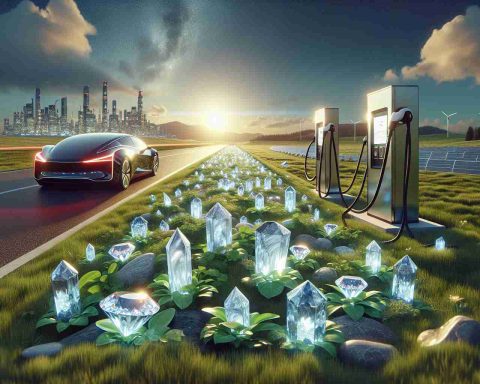The Current Landscape of Electric Vehicles in the UK
The UK’s electric vehicle (EV) market, while celebrating its past successes, now faces daunting obstacles. Recent data from Pod Point, a major EV charging provider, revealed that its 2024 revenue expectations of £60 million fell short at £53 million. This disappointing performance has led to a substantial decline in stock value, dropping by one-third.
Leading automotive manufacturers are increasingly voicing concerns about slow EV sales, which are often hindered by higher upfront costs. These companies are pressing the UK government to modify the strict sales quotas under the current zero-emission vehicle (ZEV) mandate. As it stands, they must ensure that 22% of car sales this year are electric, increasing to 28% in subsequent years. Fortunately, provisions in the regulations may allow manufacturers some leeway to sidestep heavy penalties for underperformance.
Despite notable achievements, such as a record of 382,000 EVs sold last year, industry experts warn that stagnating demand could threaten future growth. The implications extend beyond the automotive sector, as a downturn in EV adoption may impede progress toward carbon neutrality and threaten global supply chains for essential battery minerals.
Looking ahead, the resilience of the UK’s EV market is crucial not only for manufacturers but also for fostering a sustainable future. With ongoing challenges, stakeholders must seek innovative paths to drive affordability and accessibility in electric mobility.
Challenges for the Future of Electric Vehicles in the UK
The struggles faced by the UK’s electric vehicle (EV) market reflect a broader societal shift towards sustainable transportation. As the world increasingly commits to reducing carbon emissions, successful transitions to EVs impact every facet of daily life, influencing everything from urban planning to consumer behavior and energy consumption.
A decline in EV adoption not only hampers the automotive industry’s progress but also impedes broader climate goals. The UK has set ambitious targets for carbon neutrality by 2050, linking its success to widespread EV integration. If sales do not improve, the environmental ramifications could be severe. This stagnation affects not just air quality but also the global supply chain for critical battery components, raising concerns about geopolitical stability in regions rich in lithium and cobalt.
Moreover, emerging trends suggest that innovative technologies will reshape the EV landscape. Advancements in battery technology, including solid-state batteries, promise to enhance performance and reduce costs significantly. These developments could attract hesitant consumers and stimulate demand, but they require a combined push from governments, manufacturers, and infrastructure providers.
In light of these dynamics, the focus must shift towards creating a supportive ecosystem that champions affordability, infrastructure expansion, and consumer education. Such steps are not only vital for the automotive sector but essential in steering society toward a sustainable, low-carbon future.
The Untold Truth About the UK Electric Vehicle Market: Challenges and Prospects
The Current Landscape of Electric Vehicles in the UK
As the UK electric vehicle (EV) market transitions into 2024, it faces a complex web of challenges that could significantly shape its future trajectory. While there have been commendable achievements in sales and infrastructure, the path ahead requires careful navigation through concerns surrounding demand, pricing, and government regulation.
# Market Performance and Sales Challenges
Recent reports indicate a modest profitability outlook for major EV charging provider Pod Point, with revenue predictions falling short of targets for 2024. As the EV market continues to pivot, auto manufacturers have expressed growing unease regarding the stagnant sales figures, largely influenced by the higher initial costs associated with purchasing electric vehicles. According to industry analyses, the average cost of a new electric car in the UK currently sits at approximately £40,000, which remains a barrier for many potential buyers.
# Government Quotas and Manufacturer Pressures
Under the UK’s zero-emission vehicle (ZEV) mandate, manufacturers are required to ensure that 22% of their total car sales are electric for the current year, escalating to 28% in 2025. This imposed quota has prompted calls from automakers for a reevaluation of the rules, especially concerning penalties for missed targets. Insights show that flexibility in these mandates could incentivize manufacturers to push for more innovative solutions in vehicle design and technology.
# Sustainability and Global Supply Chain Impact
The slowdown in EV adoption poses a broader threat, not only to the automotive sector but also to the UK’s ambitions for carbon neutrality. Experts warn that a decline in demand could stifle investments in battery technology and supply chains, particularly for critical materials like lithium, cobalt, and nickel. These minerals are essential for manufacturing batteries and are already subject to market fluctuations and geopolitical tensions.
# The Path Forward: Innovations and Strategies
To foster growth in the EV sector, manufacturers and stakeholders must prioritize affordability and accessibility. Here are several strategies and innovations that could be pivotal:
1. Enhanced Battery Technology: Investment in solid-state batteries and alternative materials that reduce reliance on rare minerals could lead to lower production costs and longer-lasting performance.
2. Incentives for Consumers: Government subsidies and tax breaks for electric vehicle purchases may help alleviate the upfront cost and stimulate demand.
3. Public Charging Infrastructure: Increasing the number of charging stations, especially in underserved areas, will be critical for boosting consumer confidence in EV adoption.
4. Collaborative Partnerships: Engaging in partnerships across sectors—such as energy providers and technology firms—can accelerate advancements in charging solutions and optimize power use.
# Pros and Cons of Electric Vehicle Adoption
Pros:
– Environmentally friendly with lower carbon emissions.
– Reduced fuel costs for consumers in the long term.
– Lower maintenance costs compared to traditional vehicles.
Cons:
– High upfront cost remains a significant barrier.
– Limited range compared to gasoline-powered vehicles.
– Charging infrastructure still developing, leading to “range anxiety” among consumers.
# Trends and Predictions for the Future
As the UK government pushes toward its ambitious 2030 target for phasing out gas-powered vehicles, analysts predict a pivotal shift over the next few years. If the industry can overcome current obstacles, experts forecast a robust 15% annual growth in EV sales through 2030. Consumer attitudes towards sustainability are also shifting, with surveys suggesting that a growing number of drivers are prioritizing eco-friendly options in their purchasing decisions.
# Conclusion
The future of the UK electric vehicle market stands at a crossroads. While there are formidable challenges ahead, proactive strategies focused on innovation, affordability, and infrastructure development can pave the way for substantial progress. A collaborative approach among automotive manufacturers, government entities, and consumers will be crucial for achieving a sustainable and economically viable electric vehicle market in the UK. For more insights and the latest news in automotive trends, visit AutoTrade.













